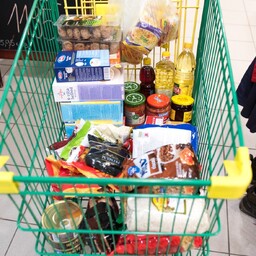Hinnad tõusevad. Inimesed ostavad vähem ja otsivad soodukaid. Välismaised tooted on odavamad.
Perekond Leis ostab toitu. Nad ostavad kanamune ja piimatooteid. Anneli Leis ütleb, et hinnad on kõrged. Ta otsib soodukaid. Ta tahaks osta rohkem puu- ja juurvilja, kuid hind on kõrge. Ta ostab marineeritud köögivilju. Ta ostis Kreekast kurki soodukaga. Eelarve oli 35 eurot, kuid
lõppsumma oli 40 eurot
.
lõppsumma oli 40 eurot
Tõlge fraasile: lõppsumma oli 40 eurot
EN
the final amount was 40 euros
Anneli ütleb, et ta peab raha kokku hoidma. Ta teab, et
raha peab jätkuma palgapäevani
.
Toidukaupade müük on vähenenud
. Inimesed ostavad vähem toitu.
Juust ja kohukesed on harvemad
.
raha peab jätkuma palgapäevani
Tõlge fraasile: raha peab jätkuma palgapäevani
EN
money needs to last until payday
Toidukaupade müük on vähenenud
Tõlge fraasile: Toidukaupade müük on vähenenud
EN
Grocery sales have decreased
Juust ja kohukesed on harvemad
Tõlge fraasile: Juust ja kohukesed on harvemad
EN
Cheese and curd snacks are rarer
Poed ütlevad, et ostutšeki pikkus on lühem. Välismaiseid tooteid on rohkem, sest need on odavamad.
Eesti toodete osakaal on langenud
. Tootjad ütlevad, et energiaaktsiisi tõus mõjutab neid.
Kohalik tooraine on kallim
.
Eesti toodete osakaal on langenud
Tõlge fraasile: Eesti toodete osakaal on langenud
EN
The share of Estonian products has decreased
Kohalik tooraine on kallim
Tõlge fraasile: Kohalik tooraine on kallim
EN
Local raw materials are more expensive
Anneli tahaks
toetada kohalikku tootmist
, kuid ta ei suuda seda endale lubada.
Tootevalik muutub kitsamaks
.
Uusi tooteid tuleb vähem turule
.
Hinnad tõusevad
. Anneli kardab, et
tulevad raskemad ajad
.
toetada kohalikku tootmist
Tõlge fraasile: toetada kohalikku tootmist
EN
support local production
Tootevalik muutub kitsamaks
Tõlge fraasile: Tootevalik muutub kitsamaks
EN
The product range is becoming narrower
Uusi tooteid tuleb vähem turule
Tõlge fraasile: Uusi tooteid tuleb vähem turule
EN
Fewer new products are coming to market
Hinnad tõusevad
Tõlge fraasile: Hinnad tõusevad
EN
Prices are rising
tulevad raskemad ajad
Tõlge fraasile: tulevad raskemad ajad
EN
harder times are coming
Prices are rising. People are buying less and looking for discounts. Foreign products are cheaper.
The Leis family is buying food. They buy eggs and dairy products. Anneli Leis says the prices are high. She's looking for discounts. She would like to buy more fruits and vegetables, but the price is high. She buys pickled vegetables. She bought cucumbers from Greece on sale. The budget was 35 euros, but the total amount was 40 euros.
Anneli says she has to save money. She knows the money has to last until payday. Food sales have decreased. People are buying less food. Cheese and curd snacks are less common.
Stores say the length of receipts is shorter. There are more foreign products because they are cheaper. The share of Estonian products has decreased. Manufacturers say the rise in energy excise duty affects them. Local raw materials are more expensive.
Anneli would like to support local production, but she cannot afford it. The product range is becoming narrower. Fewer new products are coming to the market. Prices are rising. Anneli fears that harder times are coming.
